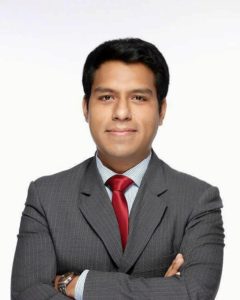Qualified as a professional Chemical Engineer, Mercy is currently employed by the Harare Institute of Technology, Zimbabwe, as a researcher. She is mainly interested in renewable energy technologies and recently received a Total Startupper of The Year Award for her InstiBriquettes project. Renzo currently works as a Legal Advisor on Energy Markets at COES-SINAC in Peru and is passionate about energy and water management issues.
Mercy Manyuchi

Can you tell me a little bit more about your involvement in FEL?
I am involved in the Energy Water Food Nexus taskforce where we are developing a position paper to be presented at the World Energy Congress. In the taskforce we are looking at upcoming strategies that will make a difference in African and Asian communities through stakeholder analysis which examines the linkages between the water, food and energy sectors.
What does being a FEL mean to you?
For me, being a member of FEL-100 means being part of a team of the most vibrant and promising future energy leaders whom have the potential to make a positive change in the energy sector.
What challenges is Africa, in particular Zimbabwe, facing regarding energy access, affordability and sustainability?
Personally I think we still need to do a lot of work in terms of provision of clean energy access, especially within rural communities. People are still mainly using raw biomass like cow dung as well as firewood for cooking, killing both our people and the environment.
You recently won a Total award for Startupper of The Year, tell us a little bit about the project?
The InstiBriquettes project provides a charcoal replacement using farm waste to power homes and create value for things farmers usually throw away. The charcoal briquettes from waste biomass are smokeless, have a higher heating value than wood. All this is made possible by the modified production process which uses both carbonisation and pyrolysis technologies.
What impact will your winning project have within local communities in Zimbabwe?
I am hoping that as a result of my project, more people in rural communities are encouraged to use alternative fuels like charcoal briquettes that are safer domestic fuels for cooking. I am also looking into developing clean cookstoves that are compatible with the briquettes.
What do you see as the emerging trends in the future of the energy sector?
Renewables: the focus on renewable energy is increasing. The market for renewable energy technologies is continuing to grow. Climate change concerns coupled with high and volatile oil prices, nuclear disasters, promotion of electric vehicles and renewable electricity, and increasing government support, are driving increasing renewable energy legislation. In rural parts of Zimbabwe, renewables can play a crucial part in lifting communities out of poverty.
The ‘Startupper of the year by Total’ challenge was set up by Total with the aim of fostering the emergence of and supporting the best projects by budding social entrepreneurs under 35 years old to create or develop businesses less than two years old that could transform their region.
Renzo Vallejo

What does it mean to you to be a Future Energy Leader (FEL-100)?
The FEL programme means a lot to me. I became a FEL to learn more about complex business processes on energy matters and, as a consequence, being able to create and implement legal strategies that achieve solutions for the current energy challenges the world is facing.
Prior to being selected, I worked for a number of energy companies and had been engaged with industry leaders and mid-level officials on various issues concerning the energy industry as member of a number of professionals associations including the Latin America Corporate Council Association. The FEL programme has helped me enhance my knowledge and gain international experience. I hope to make a significant contribution in my country. What I value about the program are its members - exceptional young professionals who share similar interests to me. It's fabulous!
How did you first hear about World Energy Council and FELs?
I had been aware of the existence of the World Energy Council since I started working several years ago. I'm fortunate to have worked on several projects in my career that have changed the energy and infrastructure industry in Peru and more recently, fostered innovation and investment in renewable energy technologies. I became aware of the FEL programme last year for the first time thanks to the Peruvian Member Committee Chairman, Mario Castillo Justo. He told me about the programme at the International Congress of Energy in Peru, and as a consequence I applied immediately to the programme.
What are the highlight events that you have attended?
I have not yet had the opportunity to attend an official event of the Council because I am still less than a year into the programme. However, I have confirmed my attendance at this year’s World Energy Congress in Istanbul. In February this year, I had the opportunity to attend the South America Hydropower Infrastructure Opportunities event held in Bogotá, where I had the opportunity to meet with Mr. Jairo Leon Garcia and other FELs with whom I shared interesting ideas. That is why I am excited about the conference in Istanbul.
What are the benefits of being a FEL?
In an increasingly global world, interconnection is essential. The FEL-100 is a programme that incorporates participants’ varied experiences and perspectives and uses working groups as an opportunity to apply new skills and capabilities. So, if you are a young professional eager to increase your knowledge, you can immerse yourself in this challenging programme. For me this is the main benefit of being a member of FEL-100. Additionally, by being a member of the group, participating in meetings or working on one of the Taskforces of an international programme such as FEL-100, I can add valuable, professional skills beyond my conventional education.
What is your involvement in the FEL programme?
I am involved in the Energy Access Taskforce. I am also in the process of preparing some guidelines to consider starting a program designed to form local youth leaders in Peru. Every year, the Peruvian Entity Regulatory organises a university extension course at the national level with the best students and graduates. I think this is a good basis to start from.
How did you come to be appointed to the editorial board of the Electricity Journal in Peru?
I was invited by its Director, Mr. José Eduardo Torres Lam to become a member of the editorial board of the Revista Electricidad in Peru. From 2013 to 2015, I contributed articles for the magazine and presented at top level conferences including the ‘ExpoEnergía’ or the ‘Renewable Energy Conference’ organised by the events’ branch of the magazine. As a result, I was offered an opportunity to be part of the advisory committee.
What does the editorial role involve?
I make specific recommendations /opinion pieces formulated by the journal. Other tasks include evaluating manuscripts or editing and writing.
What do you see as the biggest challenges for the energy industry over the next 5 years?
I think Peru will be the next big energy hub in the region along with Colombia. To achieve this and overcome existing challenges, we must develop electrical interconnections to other neighbouring countries such as Ecuador, Colombia, Venezuela, Chile, Brasil and Bolivia, to export energy in the region based on renewable energies and conventional energies. Globally, I think the big challenges will be the development of renewable technologies in all countries and overcoming the criticisms of the policies of some countries related to energy access.
Besides this, what worries me is the future of water management and its implications on human consumption and human activities such as agriculture and power generation. I think that in the future this will be a real challenge and we must be proposing solutions now.
Are you positive about the future for energy?
Yes, very much so. As long as governments keep the topic of energy high on the agenda, and continue to have institutions like the World Energy Council, private companies, public organisations and professionals committed to resolving and studying the trilemma of global energy, we will always have proposals, answers and solutions.





